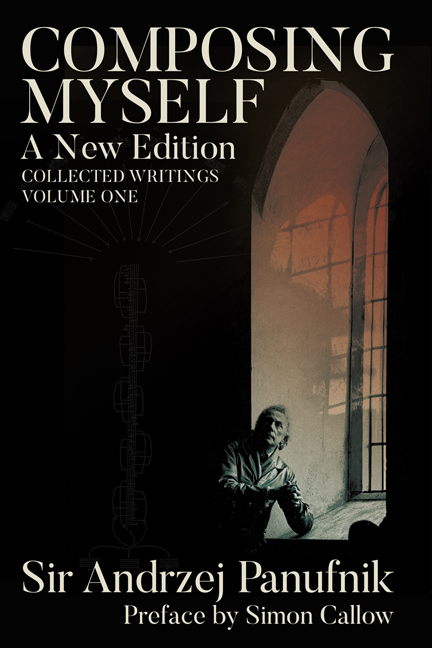Editorial Introduction
Published online by Cambridge University Press: 09 January 2024
Summary
Andrzej Panufnik occasionally protested that he was not a man of words and that his principal means of expression was music. Indeed, his relationship with words was a difficult one, conditioned by his experience in post-war Poland of how they could be misused. The resulting distrust of the microphone and of journalists was something he never lost, even after decades of living in the west. But his published output of words – which consists of the autobiography Composing Myself,1 the series of programme notes he wrote on his compositions (many of them assembled as Impulse and Design in my Music2), a number of articles in newspapers and periodicals and the thoughts he voiced in interview – is an important one.
A Polish translation of Composing Myself was published by Marginesy in Warsaw to mark Panufnik's centenary in 2014, by when the original English edition had long since become a collector's item. The idea of producing a new edition of Composing Myself – supplemented by a chapter by Camilla, Lady Panufnik, to bring the story up to date with an account of Panufnik's life after the writing of Composing Myself and a survey of the events marking the centenary – then grew to include those programme notes, articles and interviews. The initial intention was to publish them all inside a single set of covers, but the late discovery of a further cache of articles and interviews in the Panufnik archive threw that plan into disarray: it would have meant further delay, and resulted in a book of unwieldy proportions. Panufnik's obiter scripta and dicta will therefore follow in a second volume.
The principal component of this anthology, its Volume One, is Composing Myself, which Panufnik described in an interview with Robert Maycock as ‘just facts, events, in a straightforward way’; nonetheless, he admitted that ‘I didn't much like doing that’ – and Maycock adds that ‘it took heavy persuasion by friends to get it out of him’.
Even if one ignores for a moment the window it opens onto the inner life of a major composer, it is itself a valuable historical document, with its first-hand account of musical and material life in Poland both between the World Wars and after the Nazi invasion in September 1939, and its charting of Panufnik's difficult position as an internal dissident who was also a showcase cultural figure for the Communist regime.
- Type
- Chapter
- Information
- Composing Myselfand Other Texts, pp. 15 - 18Publisher: Boydell & BrewerPrint publication year: 2023

